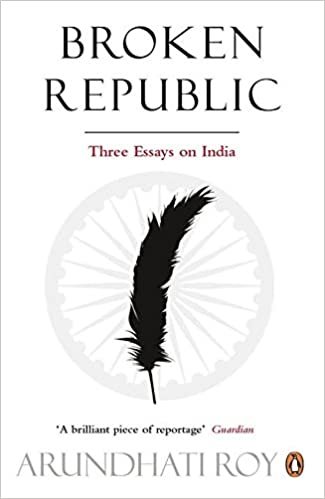Broken Republic

Rating: 4.8/5
Author: Arundhati Roy
Publisher: Hamish Hamilton
Publishing Date: 30th November 2011
Language: English
Genre: Non-Fiction
ISBN-10: 0241956978
ISBN-13: 978-0241956977
Format: Paperback
Pages: 240
Cost: Rs. 5,999 (Hardcover)
Plot:
War has spread from the borders of India to the forests in the very heart of the country. Combining brilliant analysis and reportage by one of India's iconic writers, the Broken Republic examines the nature of progress and development in the emerging global superpower and asks fundamental questions about modern civilization itself. In three incisive essays, Roy lays bare the corruption at the centre of government and industry, explores life with the Maoist guerrilla movement and reveals the thwarted search for justice and democracy in India.
Review:
Roy’s latest publication, Broken Republic, is a resolute criticism on the Indian government’s policy to allow a wholesale corporate takeover of people’s land and resources. This collection of three essays outlines the context, developments, and impact of the hazards of internal conflict on the economy of India.
This volume brings together three powerful essays-
- Mr Chidambaram's War
- Walking with the Comrades
- Trickledown Revolution
The Naxal-Maoist insurgency in India’s ‘Red Corridor’ is a fifty-year-long struggle against the central government, has gained greater urgency with the launch of Operation ‘Green Hunt’ in November 2009. The deployment of paramilitary troops to intensify the offensive on ‘the biggest internal security challenge ever faced’ falls on the regions richest in natural mineral resources. The book comments heavily on this issue of alienating and ‘making-a-monster’ out of the Naxal-Maoists.
It covers a wide range of issues not only relevant to the Maoists, but also to wider problems of inequality, democracy, and civilisation. She discusses women in these areas and the harmony they share in the form of sabhas and groups, something that is not normally spoken of in the mainstream media. She then further mentions about the health condition of the tribals, especially children, which are very heart-breaking to read about. Also, the vivid imagery of the Bhumkal festival is very well portrayed.
Another beautiful piece that stands out in the collection is ‘Walking with the Comrades’ – a lyrical reportage of Roy’s three weeks spent following the Maoist guerrilla fighters in the Chhattisgarh State in late 2009, shortly after the launch of ‘Operation Green Hunt’.
These essays combine brilliant analysis and reportage-all through which Roy raises some really needed fundamental questions.
About the Author:
Arundhati Roy was born in 1960 in Kerala, India. She studied architecture at the Delhi School of Architecture and worked as a production designer. She has written two screenplays including Electric Moon (1992) that was commissioned by Channel 4 television.
Her first novel ‘God of small things’ won the Booker Prize for Fiction in 1997. An immediate bestseller, the novel was published simultaneously in 16 languages and 19 countries but caused controversy in India for the description of a love affair between a Syrian Christian and a Hindu 'untouchable'. She is also the author of several non-fiction books including The Cost of Living (1999) - a highly critical attack on the Indian government for its handling of the controversial Narmada Valley dam project and for its nuclear testing programme; Power Politics (2001)- a book of essays; and The Algebra of Infinite Justice- a collection of journalism. The Ordinary Person's Guide to Empire was published in 2004. She has since published a further collection of essays examining the dark side of democracy in contemporary India ‘Listening to Grasshoppers: Field Notes on Democracy’ (2009).
Her latest book is ‘The Ministry of Utmost Happiness’ (2017), her second novel. It was longlisted for the Man Booker Prize and, in the US, was a finalist for the National Book Critics Circle Award. For her work as an activist she received the Cultural Freedom Prize awarded by the Lannan Foundation in 2002.















































